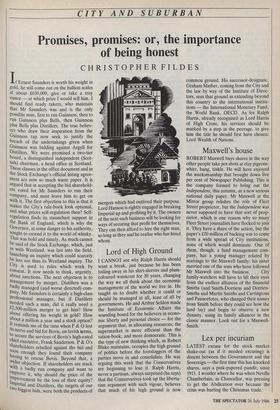Lord of High Ground
I CANNOT see why Ralph Harris should want a break, just because he has been toiling away in his shirt-sleeves and plum- coloured waistcoat for 30 years, changing the way we all think about the economic management of the world we live in. He taught us to doubt whether it could or should be managed at all, least of all by governments. He and Arthur Seldon made the Institute of Economic Affairs the sounding board for the believers in econo- mic liberty and personal choice — for the argument that, in allocating resources, the supermarket is more efficient than the ration-book, and more democratic. This is the type of new thinking which, as Robert Blake maintains, occupies the high ground of politics before the footsloggers of the parties move in and consolidate. He was arguing this week that the Conservatives are beginning to lose it. Ralph Harris, never a partisan, always surprised (he says) that the Conservatives took up the liberta- rian argument with such vigour, believes that much of his high ground is now common ground. His successor-designate, Graham Mather, coming from the City and the law by way of the Institute of Direc- tors, sees that ground as extending beyond this country to the international institu- tions — the International Monetary Fund, the World Bank, OECD. As for Ralph Harris, already recognised as Lord Harris of High Cross, his. services should be marked by a step in the peerage, to give him the title he should first have chosen: Lord Wealth of Nations.


















































 Previous page
Previous page